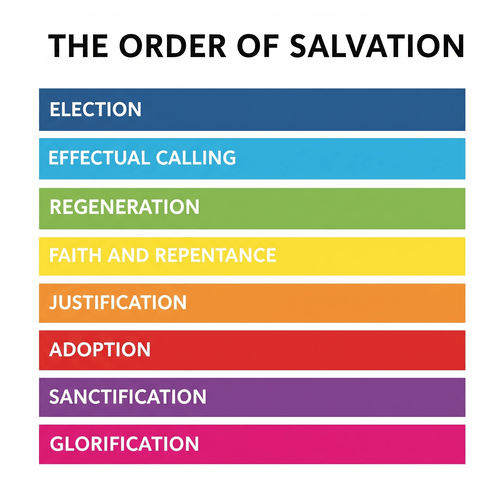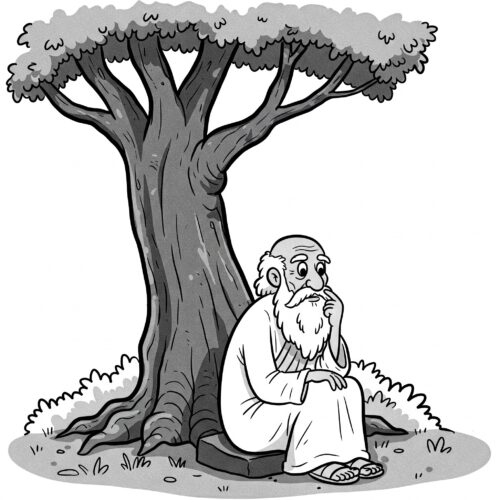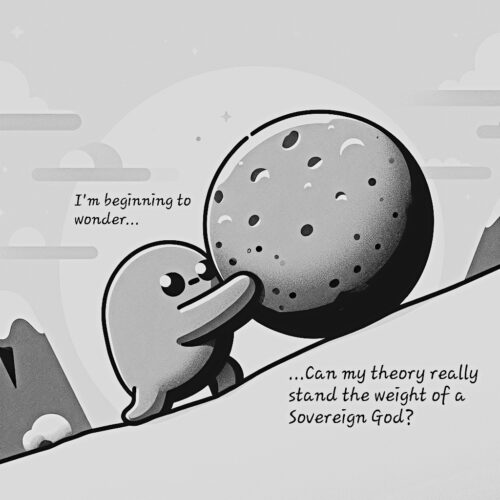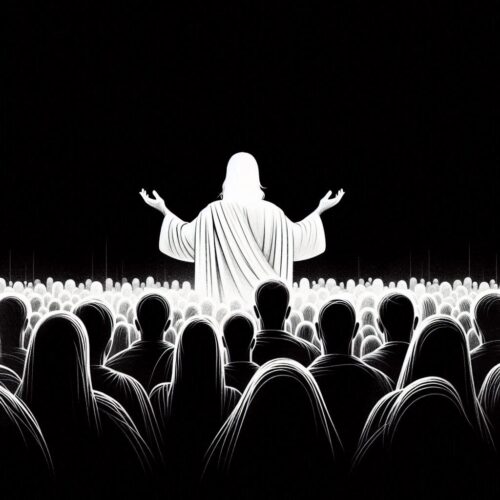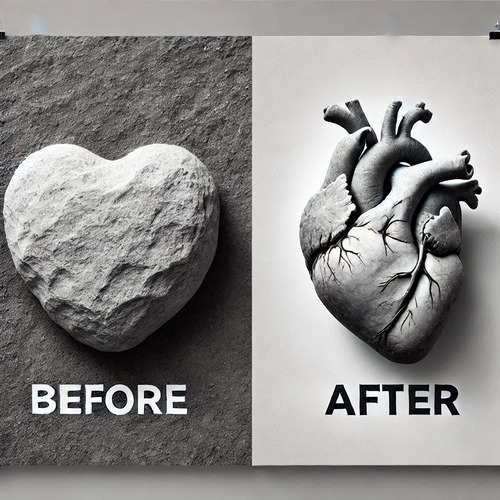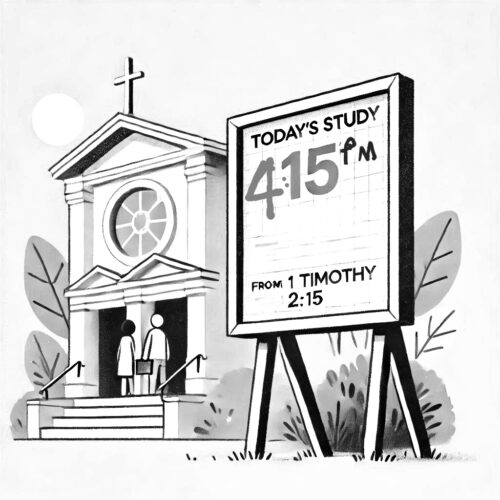Order of Salvation: At What Point Can I Call Myself Christian?
Picture this: A teenager walks down the aisle at summer camp, prays a prayer, and gets baptised. A church-going teenager receives the first communion. A seeker reads Scripture and suddenly believes. An infant is sprinkled with water. Which of these people can legitimately call themselves Christian? When exactly does someone cross the line from non-Christian to Christian?
This isn’t just theological hair-splitting—it’s a question with eternal significance and profound pastoral implications. Thankfully, Scripture provides clarity through what theologians call the “order of salvation” (the ordo salutis). Join us as we explore the Reformed tradition’s biblically faithful answer.
UNDERSTANDING THE ORDER OF SALVATION
The order of salvation describes how God saves sinners, breaking down salvation into distinct but unified aspects. Reformed theology recognises both a logical order (how these elements relate to each other) and the reality that these elements can, and often do, occur simultaneously in experience.
The classical Reformed sequence unfolds as follows:
- Election (God’s eternal choice)
- Effectual Calling (God’s irresistible summons)
- Regeneration (spiritual rebirth)
- Faith and Repentance (our response)
- Justification (legal declaration of righteousness)
- Adoption (becoming God’s children)
- Sanctification (lifelong growth in holiness)
- Glorification (final perfection).
But here’s the crucial question: At which point does someone actually become a Christian?
THE CRITICAL MOMENT: REGENERATION
According to Scripture and Reformed theology, we become Christian at the moment of regeneration—when God makes us spiritually alive. This happens before we exercise faith, not because of it.
Jesus made this clear to Nicodemus: “Unless one is born again he cannot see the kingdom of God” (John 3:3). Notice the order—being born again comes before seeing or entering God’s kingdom. You must first receive new spiritual life before you can respond in faith. Paul reinforces this in Ephesians 2:1-5, explaining that God “made us alive together with Christ” while we were still “dead in our trespasses.”
First John 5:1 provides perhaps the clearest statement: “Everyone who believes that Jesus is the Christ has been born of God.” The verb tense is crucial—those who presently believe have already been born of God. Regeneration precedes and enables faith.
Why is regeneration the decisive moment? Because it’s when God creates new spiritual life where none existed before. The unregenerate person is “dead in trespasses and sins” (Ephesians 2:1)—spiritually incapable of responding to God. But regeneration changes everything. It makes us a “new creation” (2 Corinthians 5:17), fundamentally altering our nature and enabling us to believe.
This isn’t merely academic. Regeneration is permanent and irreversible. Once God imparts spiritual life, we possess it forever. We may not all feel different initially, but we are ontologically different—we have crossed from death to life.
FAITH AS EVIDENCE, NOT CAUSE
This raises an obvious objection: “But I didn’t feel regenerated before I believed!” That’s precisely the point. Faith is regeneration becoming conscious of itself. It’s the first act of our new spiritual nature.
Think of it this way: faith doesn’t create new life; new life creates faith. Faith is the instrument by which we receive salvation’s benefits, not the ground of salvation itself. Romans 3:28 says we’re justified “by faith,” not “because of faith”—a crucial distinction.
In experience, regeneration and faith happen simultaneously. We don’t feel ourselves being regenerated, then later choose to believe. Rather, we suddenly find ourselves believing because we’ve been made spiritually alive. Faith is evidence that regeneration has already occurred.
ADDRESSING COMMON MISCONCEPTIONS
Evangelicals mistakenly often tend to locate the moment of becoming Christian elsewhere:
- Some say, “I became Christian when I prayed the sinner’s prayer.” But prayer doesn’t create new life—new life creates the desire and ability to pray. The prayer may coincide with regeneration, but it doesn’t cause it.
- Others point to baptism. While baptism is a crucial ordinance, it signifies what has already occurred spiritually. It’s the visible sign of invisible grace, marking you as part of the visible church, but the spiritual reality precedes the physical symbol.
- Perhaps most commonly, people say, “I chose Jesus and became a Christian.” But this reverses the biblical order. John 15:16 records Jesus saying, “You did not choose me, but I chose you.” Your choice flows from your new nature; it doesn’t create that nature.
PRACTICAL IMPLICATIONS
Understanding this brings tremendous pastoral benefits.
- For personal assurance, we look to our present faith, love for God, and spiritual fruit—not to finding the exact moment of conversion. Many believers torment themselves trying to pinpoint when they “really” got saved. But if we presently trust Christ, we can be confident we’ve been regenerated, regardless of when or how dramatically it occurred.
- For evangelism, this understanding keeps us focused on preaching the gospel while trusting the Holy Spirit to regenerate hearts. We call people to faith and repentance as evidence of new life, not as means of creating it.
- For discipleship, let’s remember our new nature doesn’t mean instant maturity. The regenerate believer still struggles with sin and grows gradually in sanctification. Don’t mistake spiritual immaturity for our unregenerate condition.
THE BOTTOM LINE
We become Christian at the moment God regenerates us—makes us spiritually alive. This typically coincides with our first exercise of faith, but regeneration is the underlying reality that makes faith possible. Faith, repentance, and other responses flow from this new spiritual life.
This view provides both biblical fidelity and pastoral comfort. We don’t become Christian by praying a prayer, walking an aisle, or being baptised—though these may accompany salvation. We become Christian when the Holy Spirit imparts new life, evidenced by genuine faith in Jesus Christ.
ORDER OF SALVATION: RELATED FAQs
What about infant baptism? Are baptised babies already Christians? John Calvin and Charles Hodge distinguished between covenant membership and regeneration. Baptised infants are part of the visible church and covenant community, but they become Christians individually when God regenerates them—which may happen in infancy, childhood, or later. The sacrament marks covenant inclusion, not the moment of spiritual rebirth.
- Can one be regenerated but not yet believe? How long is the gap? Reformed theologians like Louis Berkhof argue that while regeneration logically precedes faith, the gap is practically non-existent in conscious beings. RC Sproul compared it to lightning and thunder—distinct but virtually simultaneous. However, some suggest regeneration might occur in infancy or unconscious states, with faith emerging when the person becomes capable of a conscious response.
- What about people who “lose their faith” later? Were they never really Christians? According to Reformed doctrine, truly regenerated individuals cannot lose salvation (perseverance of the saints). John Owen and John MacArthur explain those who permanently abandon faith likely experienced temporary enthusiasm rather than genuine regeneration. However, true believers may experience seasons of doubt or backsliding while retaining their regenerate nature deep down.
How does this view affect evangelism? Should we still call people to “accept Jesus”? Evangelists like George Whitefield and Charles Spurgeon still urgently called people to faith and repentance, knowing God uses these means to awaken the regenerate heart. We preach to everyone because we don’t know whom God has chosen or when He’ll regenerate them. The call to “accept Jesus” isn’t wrong if understood as evidence of regeneration rather than its cause.
- What about gradual conversion versus dramatic conversion experiences? The Reformed perspective accommodates both patterns. Scholars like Sinclair Ferguson note that some (like Timothy) seem to believe from earliest memory, suggesting early regeneration, while others (like Paul) experience dramatic adult conversion. The key isn’t the drama or timing but whether genuine regeneration has occurred, evidenced by lasting faith and spiritual fruit.
- Do Reformed scholars agree on every detail of the order of salvation? No, there are nuanced debates within Reformed theology. John Murray questioned whether regeneration and faith can be strictly separated, preferring to speak of “regeneration-faith” as one complex reality. Others debate whether justification and adoption are simultaneous or sequential. However, all agree regeneration precedes any human contribution to salvation.
What about deathbed conversions? Are they genuine? Scholars like JI Packer acknowledge genuine last-minute regeneration is possible—the thief on the cross being the prime example. However, they caution against presuming upon God’s grace. True deathbed conversion produces genuine repentance and faith, even if there’s no time to demonstrate fruit. The absence of subsequent holy living makes assessment difficult but doesn’t invalidate genuine regeneration.
ORDER OF SALVATION: OUR RELATED POSTS
- The Ordo Salutis: What are the Seven Steps in Our Salvation?
- Can a Sinner be Saved from Sin’s Consequences? Is There Hope?
- Consequences of Sin in Genesis 3: Fall and Redemption
- Salvation: By Faith Or Works? Or Both?
- Assurance of Salvation: Can I Really Know I’m Saved?
- Why Does God Show Grace to Some Sinners and Send Others to Hell?
- God’s Foreknowledge: Far More Than Mere Foresight
Editor’s Pick
The Euthyphro Dilemma: Did God Invent Morality or Discover It?
A Biblical Creationist Answer to the 2400-Year-Old Question The Euthyphro Dilemma has challenged folks for over 2,400 years. First posed [...]
Outdo One Another in Showing Honour: What Does It Really Mean?
“Love one another with brotherly affection. Outdo one another in showing honour.” Paul’s instructions in Romans 12:10 present us with [...]
The Anthropic Principle: How’s Our Universe Designed for Life?
Ever wondered why our universe seems so perfectly suited for life? The Anthropic Principle addresses this very question: it notes [...]
Who Wrote the Gospels? Evaluating Modern Scholarship
The four Gospel writers—Matthew, Mark, Luke, and John—are the foundational witnesses to Christ's life and teaching. Yet, the question of [...]
The Fossil Record: Does It Really Show We Evolved from Apes?
The Fossil Record: Does It Really Show We Evolved from Apes? The fossil record has long been presented as [...]
Wrestling with Identity: When God Asks Jacob His Name
In the darkness by the Jabbok River, Jacob wrestles with a mysterious figure until daybreak. Exhausted and injured, yet refusing [...]
The Fatal Flaws of Middle Knowledge: A Reformed Critique
Middle Knowledge is one of the most sophisticated attempts to reconcile divine sovereignty with human freedom. Proposed by the 16th [...]
If Jesus is God, Why Does He Call Himself ‘Son of Man’?
A fascinating aspect of Jesus' ministry is how He repeatedly refers to Himself as the "Son of Man." The title [...]
The Mystery of Salvation: Why Did God Keep His Plan a Secret?
In the economy of God's revelation, some truths remain veiled until the time appointed for their disclosure. The plan of [...]
What Does It Mean to Be a ‘Slave’ to Righteousness?
"And having been set free from sin, you became slaves of righteousness." - Romans 6:18 (NKJV) Given how highly we [...]

